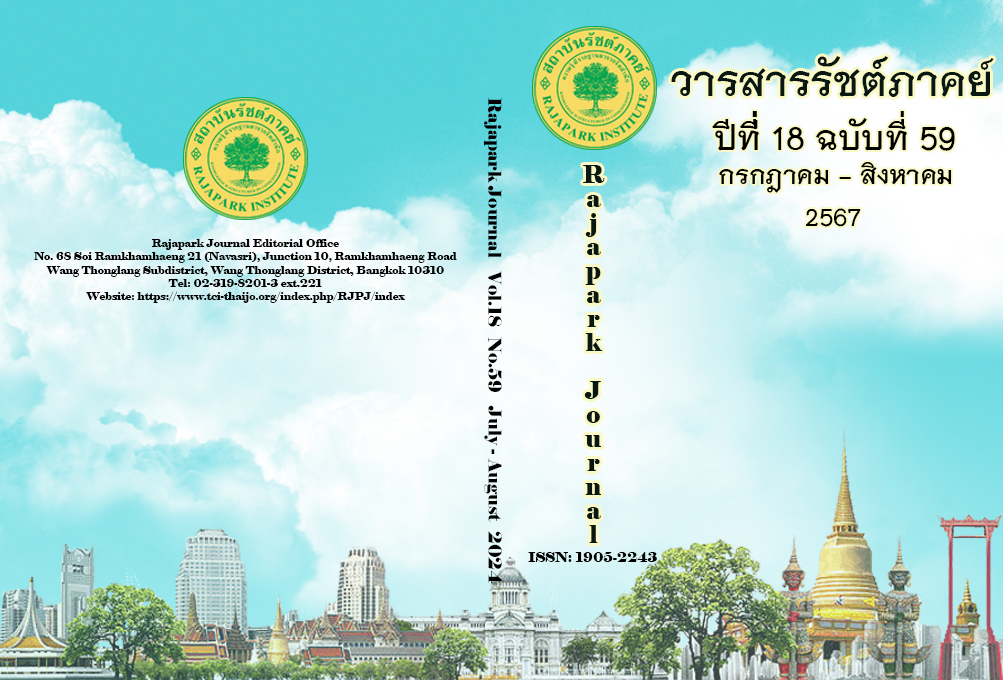Digital Competency Development Model to Promote Learning Management for Private School Administrators
Main Article Content
Abstract
The research aimed to study the elements and guidelines of digital competency development to promote learning management for private school administrators by using the questionnaire among the sample group of 500 private school administrators; the data were analyzed by confirmatory factor analysis; and interviewing 6 experts which the information was analyzed by content analysis; and 2) construct and examine the digital competency development model to promote learning management for private school administrators model through a focus group discussion of 10 experts. The data were analyzed by mean, standard deviation, and content analysis; and 3) the model was evaluated through questionnaires among the sample group of 178 private school administrators. The data were analyzed by mean and standard deviation. The results showed that 1) the elements of digital competency to promote learning management for private school administrators are composed of vision, professional development, staff empowerment, data management, resource management, work environment, digital literacy, collaboration, communication, creativity, and problem-solving. The guidelines of digital competency development consisted of a four-step development process and nine learning methods. 2) The model is composed of 5 components: 1) the principles; 2) the objectives; 3) the scope of digital competency; 4) the competency development guideline; and 5) key success factors. The result of the propriety assessment of the model indicated by the experts was at the highest level. 3) The result of the feasibility assessment by the private school administrators was at a high level, while the utility assessment was considered at the highest level.
Article Details

This work is licensed under a Creative Commons Attribution-NonCommercial-NoDerivatives 4.0 International License.
Views and opinions appearing in the Journal it is the responsibility of the author of the article, and does not constitute the view and responsibility of the editorial team.
References
Asawapoom, S. (2018). Revision of Concepts and Research Methodology on Models and Model Development. Buabandit Journal of Educational Administration, 18(1), 1-13.
Bardo, J. W., & Hartman, J. J. (1982). Urban Society: A Systemic Introduction. Peacock.
Buachu, T., & Buachu, T. (2019). The Status of Digital Leadership of Education Management Administrators. Journal of Educational Studies, 13(2). 285-294.
Behrens, S., Alberts, C., & Ruefle, R. (2012). Competency Lifecycle Roadmap: Toward Performance Readiness. https://doi.org/10.1184/R1/6572693.v1.
Chaemchoy, S. (2018). School Administration in the Digital Era. Chulalongkorn University.
Chamonman, U. (1998). What is a Model?. Chulalongkorn University.
Comrey, A. L., & Lee, H. B. (1992). A First Course in Factor Analysis. Erlbaum.
Ferrari, A. (2012). Digital Competence in Practice: An Analysis of Frameworks. Seville: JRC-IPTS. http://ftp.jrc.es/EURdoc/JRC68116.pdf
Junyathum, P. (2021). Administration for Private School in Digital Era. Doctoral dissertation, Silpakorn University.
Khantong, N., & Boobpha, S. (2021). Digital Skills of School Administrators Affecting Work Motivation of Teachers under Nongkhai Secondary Educational Service Area Office. Journal of Modern Learning Development, 6(4), 148-163.
Kin, T. M., & Kareem, O. A. (2019). School Leaders’ Competencies That Make a Difference in the Era of Education 4.0: A Conceptual Framework. International Journal of Academic Research in Business and Social Sciences, 9(5), 214–225.
Klanpaitoon, S. (2021). A Model for Developing Administrator’s Instructional Leadership in the Digital Age[Doctoral Dissertation, Naresuan University].
Ministry of Education. (2564). Digital Transformation for Education Action Plan 2020-2022. Bureau of Information and Communication Technology.
Nijaneat, C. (2018). Model Development Research in Social Sciences and Education. Suratthani Rajabhat Journal, 4(2), 71-100.
OECD: Organisation for Economic Co-operation and Development. (2018). The Future of Education and Skills: Education 2030. https://www.oecd.org/education/2030-project/
Office of the Education Council. (2021a). Research Report on Guidelines for Promoting Learning Linked to the National Digital Learning Platform in Thailand. Prikwan Graphic.
Office of the Education Council. (2021b). The Appropriate Learning Ecosystems Conditions to the Thai Context. S.B.K Printing.
Office of the Education Council. (2024). Outlook, Trends and Directions of Thailand Educational Development 2027. https://www.onec.go.th
ONDE: Office of the National Digital Economy and Society Commission. (2019a). The State of Thailand’s Digital Economy and Society Development 2019. https://www.onde.go.th/assets/portals/1/ebookcategory/18_Booklet_1/
ONDE: Office of the National Digital Economy and Society Commission. (2019b). 25 Elements Digital Competency. https://www.dlbaseline.org/digital-competency
Panich, V. (2020). World-Class High Quality Education. Siam Commercial Foundation.
Phengsawat, W. (2010). Model Development Research. Rajabhat Sakon Nakhon University Journal, 2(4), 2-14.
Redecker, C. (2017). European framework for the digital competence of educators: DigCompEdu. https://joint-research-centre.ec.europa.eu/digcompedu_en
Srivastava, K., & Dey, S. (2018). Role of Digital Technology in Teaching-learning Process. IOSR Journal of Humanities and Social Science, 23(1). 74-79.
Srisa-ard, B. (2010). Preliminary Research (5th ed.). Suviriyasarn.
Supising, J., Puthaprasert, C., Musikanon, C., Poungkaew, P., & Kosanpipat, S. (2021). School Management Paradigm in Digital Disruption Era. Interdisciplinary Research Review, 16(2), 19– 25.
Trotter, A., & Ellison, L. (1997). Understanding Competence and Competency, in Davies, B. and Ellison, L. (Eds.) School Leadership for the 21st Century: A Competency and Knowledge Approach. Routledge.
University of Waterloo: Centre for Teaching Excellence. (n.d.). Self-Directed Learning: A Four-Step Process. https://uwaterloo.ca/centre-for-teaching-excellence/catalogs/tip-sheets/self-directed-learning-four-step-process
Wannasri, J. (2021). Educational Management in the Digital Age. Rattanasuwan.
Yamane, T. (1973). Statistics: An Introductory Analysis (3rd ed). Harper and Row.


